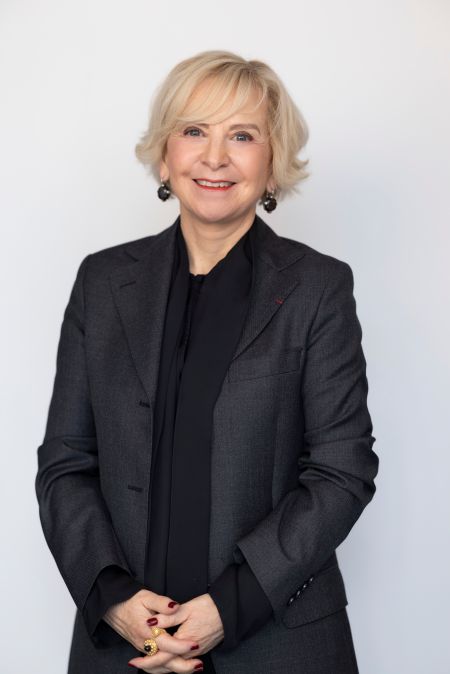 |
INTERVIEW – BÉNÉDICTE ÉPINAY, EXECUTIVE DIRECTOR OF THE COMITÉ COLBERT: "TODAY, EXCELLENCE CANNOT EXIST WITHOUT RESPONSIBLE INNOVATION" (France)
Under the leadership of its Executive Director, the iconic Comité works to preserve the excellence of French luxury while strengthening the appeal of the professions that bring it to life. |
Catégorie : Europe - France - Économie du secteur
- Carrières
- Interviews et portraits
- Expériences exclusives
- Tendances, avis d'expert - Carrière - Événements - Interviews - Les Leaders du secteur
Interview de Vanessa Guerrier-Buisine le jeudi 25 septembre 2025
 Bénédicte Épinay, General Delegate of the Comité Colbert
Crédit photo © David Atlan
At the head of this institution, Bénédicte Épinay has been its general delegate since 2020. Throughout her career as a journalist, which took her from the editorial offices of Le Figaro to the top of the Les Échos – Le Parisien group, she has made people and community the pillars of her commitment. Today, she works to support the members of the Committee in their transformations.
Among the hospitality establishments that are members of the Committee, several flagships of the French luxury hotel industry are actively involved in this dynamic, including the Plaza Athénée, Le Meurice, Le Bristol, and the Four Seasons George V, as well as the Ritz Paris, Cheval Blanc Courchevel, Airelles Courchevel, and Les Prés d'Eugénie. All of them cultivate a commitment to refinement, personalized service, and the transmission of an authentic art of living.
All members of the Committee share a desire to preserve their DNA while looking to the future. It is in this dialogue between tradition and modernity that the Comité Colbert sets out its missions: to promote the attractiveness of front-line professions, to support CSR transformations, to stimulate strategic thinking around innovation, and to promote French luxury internationally, as in the exhibition planned for New York in 2026 to celebrate 250 years of Franco-American friendship.
Bénédicte Épinay shares with Journal des Palaces her vision of contemporary excellence and the driving role that luxury houses can play in a world in transition.
Journal des Palaces: What does excellence in luxury mean to you today? Has it evolved in recent years?
Bénédicte Épinay: The Comité Colbert was founded in 1954 on the initiative of one man, perfumer Jean-Jacques Guerlain, who wanted to bring French luxury houses together around a shared vision and project: promoting French luxury excellence and art de vivre. The founding charter already included a concern for preserving the arts and crafts as an essential component of this industry, both its life insurance and the guarantee of its excellence.
Traditionally focused on artisanal perfection and the rarity of materials, excellence has broadened in recent years to include sustainability and social responsibility (traceability, carbon footprint, respect for artisans) It is also fuelled by technological innovation in the service of the guest. Finally, it incorporates a more cultural and experiential dimension, with luxury products becoming vectors of history and imagination.
How can excellence, innovation, and responsibility be reconciled in luxury houses?
These three dimensions are not antagonistic: they even reinforce each other. Today, excellence cannot exist without responsible innovation, and innovation can only be legitimate if it respects heritage and the planet. Luxury and innovation are often mistakenly pitted against each other. Yet rarely has an industry been so adept at adopting the new technologies of its time in order to remain relevant.
Half of the companies in the Comité Colbert were founded in the early 19th century, which means that they all benefited from the advent of the train, the sewing machine, electricity, the telephone, the lift, the automobile, and many other innovations. If this had not been the case, you would no longer hear of Hermès, which began in the world of equestrian craftsmanship, or Louis Vuitton, which started out as a trunk maker.
Can excellence still be synonymous with slowness and rare skills in a world that values speed? How does the Comité Colbert help its members adapt without losing their identity?
Yes, because in the luxury sector, slowness is not a handicap but an added value: it guarantees precision, authenticity, and the artistic dimension of the craft. Luxury draws its strength from this unique temporality, which contrasts with the immediacy of the contemporary world.
The Comité Colbert supports its members by promoting this craftsmanship through events in France and abroad. We are also involved in a collective dialogue with institutions to reconcile the long time frame of creation with the demand for economic efficiency. Finally, our work on innovation aims to help our members equip themselves with the right tools to boost their competitiveness.
What are the conditions for joining the Comité Colbert, particularly for hoteliers? Would you like all French luxury hotels to be members?
The same conditions for membership apply to all our members, regardless of their industry. We currently have several Parisian luxury hotels among our members, such as the Plaza Athénée, the Meurice, the Bristol, and the Four Seasons George V. We also have three luxury hotels in the provinces, Cheval Blanc Courchevel, Les Airelles Courchevel, and Les Prés d'Eugénie. In addition, there are two prestigious properties that do not have the Palace label: the Ritz Paris and L'Oustau de Baumanière.
We do not aim to include all luxury hotels, just as we do not include all champagnes or all jewellers. Becoming a member of the Comité Colbert is demanding. It also means that candidates are interested in collective action: thinking together about the challenges of tomorrow in order to perpetuate the spirit of luxury and the French art of living.
You conducted a joint study on retail and front-line talent. What areas for improvement did you identify in order to attract and retain this talent in the luxury industry?
Conducting studies like this one with MAD is our way of providing our companies with food for thought on human resources challenges. The figures presented on this occasion were worse than we expected.
Not only did 60% of our companies tell us that they were having difficulty recruiting for these front-line positions, but 93% were also struggling to fill management positions in the field. In fact, 67% believe that the situation, far from improving, will deteriorate. Among the ideas discussed was the arrival of artificial intelligence in HR management, which could be a game-changer. While 87% of our companies do not currently use AI, 77% plan to do so within three years.
How do you support your members in valuing and retaining these front-line talents, who are so essential to the guest experience?
As a recognized association of general interest, the Comité Colbert does not seek to replace our companies when it comes to strategic decisions such as HR management.
However, the fifth edition of our free career guidance event, Les Deux Mains du Luxe, which will be held in a few days, from October 2 to 5 at the Grand Palais, is a valuable aid in attracting new talent to our companies. Over four days, 32 member companies of the Comité Colbert, including the Ritz Paris, and 20 vocational schools will enable young people and adults undergoing retraining to familiarize themselves with our professions. Admission is free upon registration: www.lesdeuxmainsduluxe.com.
How can member houses enhance their appeal by taking care of their teams' well-being?
Professional life is no longer a long, quiet river. The appeal of companies has become key since the end of the pandemic. Everywhere, turnover is high. Salaries, work-life balance, career paths: on all these points, all companies, particularly our members in the hospitality and catering sector, have made considerable progress to meet the desires of a more volatile generation. The figures from France Travail give pause for thought. They show that the average length of time spent in the same job is around five years and that today's young workers will change jobs 13 to 15 times during their lifetime.
For a long time, the appeal of luxury has been based as much on pride in belonging as on quality of life at work. We need to rediscover this power of attraction by promoting the meaning of the professions, developing training and recognition policies to retain talent, offering working conditions that promote work-life balance, cultivating diversity and inclusion as guarantees of creativity and modernity, and finally, highlighting the responsible commitment often sought by younger people.
In your opinion, what are the main challenges that French luxury hospitality will have to face in the coming years?
In my opinion, the number one challenge remains recruiting and retaining talent to meet the demands of a increasingly discerning guest in terms of experience, personalization, emotion, and authenticity.
The hospitality industry will also have to integrate technological tools (AI, data, augmented hospitality) without distorting human hospitality and the French art of hospitality. Finally, companies must demonstrate their commitment to sustainable development while maintaining standards of excellence.
What are the Comité Colbert's medium-term projects?
Two studies are in the pipeline. In September, the fourth chapter of our reflection on luxury and technology with Bain & Company will focus on the technological investments needed to support the transformation of the industry.
Then in November, we will publish our first CSR report with MAD, summarizing the non-financial reports known as CSRDs published by our companies before the summer. This will provide a better understanding of our members' commitments to combating global warming.
In addition, we are working on an exhibition project for next year in New York to mark the diplomatic celebration of 250 years of Franco-American friendship. Our exhibition at The Shed will reveal the secret American history of our houses.
|
|







